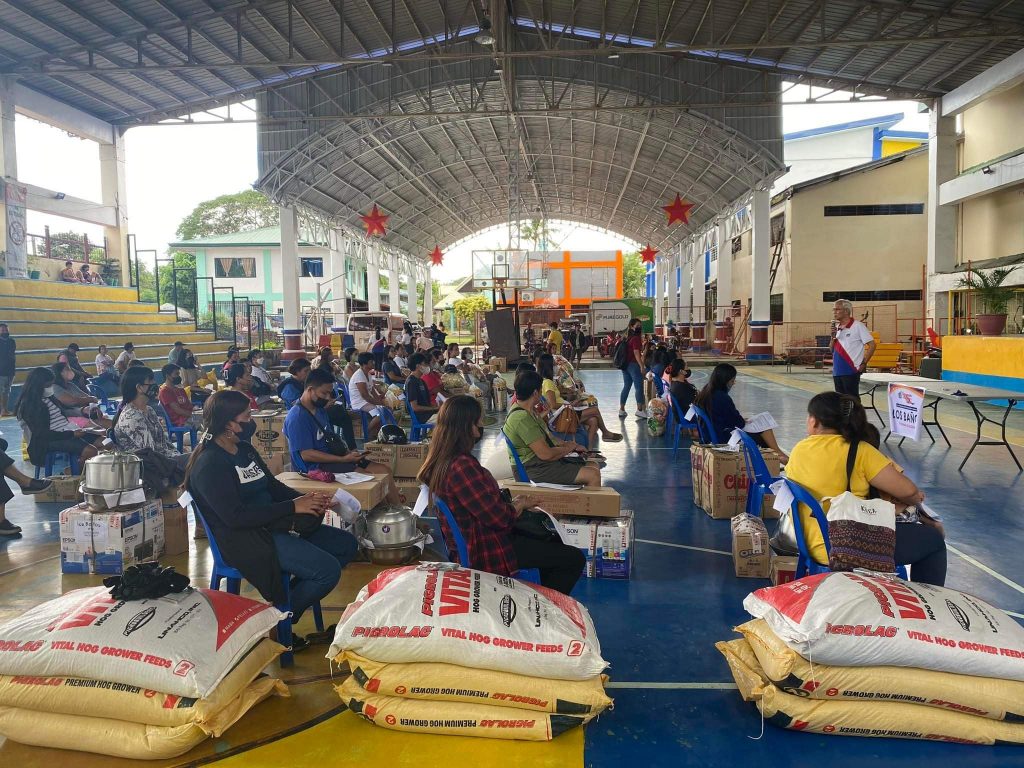
Being an agripreneur may sound easy for some, but for Marivic Quiatchon, she has to go through bumpy road of struggles to reach her goals.
Marivic, a 43-year-old wife, is a backyard hog raiser from an upland barangay in Los Baños, Laguna. She started the business in order to provide additional income for her family. Her goal is to grow the business to stop her husband from being a construction worker.
“Nagkaka-edad na kami, gusto ko din naman na tumigil sa pagtatrabaho ang asawa ko, lalo na at alam kong nahihirapan sya,” Marivic said.
Similar to other businesses, capital is her primary dilemma. Without tangible proof of stable source of income, she has a hard time acquiring credits from different bank institutions. The only option left for her was loan sharks who do not need any documents in order to lend some money. Turning a blind eye on high interest rate, she borrowed from 5’6 operators just to keep the business running.
Rough Road Ahead
Everything was going well. She was able to pay her loans and had enough for her family’s expenses. However, in 2019, Marivic faced her greatest fear – African Swine Fever (ASF) hit the country.
ASF is a viral disease affecting pigs and wild boar with up to 100% case fatality rate. Hitting a third world country, it led to thousands of hog deaths and desolation of most hog farms.
“Hindi ko alam sa’n ako huhugot ng pag-asa. That time, meron akong siyam na baboy. Konti na lang [e] pambenta na. Sampung buwan kong inalagaan para maibenta pero dahil sa ASF, wala, lugi talaga. Php80,000 ang nalugi,” Marivic said.
She had to stop her hog raising business until the region was clear from the outbreak.
Just when you thought everything would eventually recover from ASF, there came the COVID-19 pandemic, which brought the entire country to its knees. As cities and the public were forced into isolation, people’s routine and lives greatly changed and many had lost their source of income. Marivic’s family was not spared from the economic downturn. Her children lost their jobs due to lockdown restrictions and her husband temporarily stopped from working in a construction company.
Without a stable source of income, her family planted vegetables for survival but foliage farming was not enough. She then returned to lending operators for her family’s expenses and increasing debt.
Paved Way To Success
She had hope when she heard that government agencies opened more opportunities for microentrepreneurs to recover, like the Pangkabuhayan sa Pagbangon at Ginhawa (PPG) program of the Department of Trade and Industry (DTI). PPG is a post-disaster response livelihood seeding and entrepreneurship development program for micro-enterprises which aims to assist individuals and families affected by fire incidents and other calamities, including health disasters such as pandemics, and individuals and enterprises in National Capital Region who have voluntarily moved to identified rural areas under the Balik Probinsya Program for the purpose of establishing or relocating an enterprise. The program aims to provide needed resources that will support the recovery and continuity of affected businesses and individuals and/or families.
Granted with Php8,000.00 worth of livelihood kit, Marivic put up a feed business. The Department also conducted entrepreneurial training for the owners in order to develop their capabilities, thus increasing the firm’s productivity. She learned about the importance of having an entrepreneurial mindset and keeping the business sustainable. This training has built her confidence in managing the enterprise and motivated her to invest more time and energy in handling his feed business. She realized that the feed store could be a good and stable source of income for her and could recover her previous livelihood. This thinking greatly elevated her business in terms of marketing innovations and costing.
DTI Laguna’s interventions are reflected in the enterprise’s success figures. Three months after being provided with the assistance, her capital increased by 20% and her sales increased by 50%. Out of her earnings from the feed business, she was able to pay for her daily expenses and remaining loans. She was also able to revive her farm. She purchased piglets and slowly recovered from the effect of ASF and the COVID-19 pandemic.
Marivic said that she and her family are grateful to everyone who assisted them in their business journey, particularly DTI — from changing her mindset to successfully sustaining the enterprise — as it greatly helped their family’s income and it gave them the courage to gradually get out of poverty.
Similar to the case for pig farming, growth will not occur overnight. It takes long nights with the right tool, knowledge, effort and patience to help hogs grow and achieve profitability. The same has happened with Marivic — her success is the result of all her efforts combined with the assistance of a supportive government. It took years to recover but the outcome is definitely worthwhile. ♦
Date of Release: 26 June 2023


